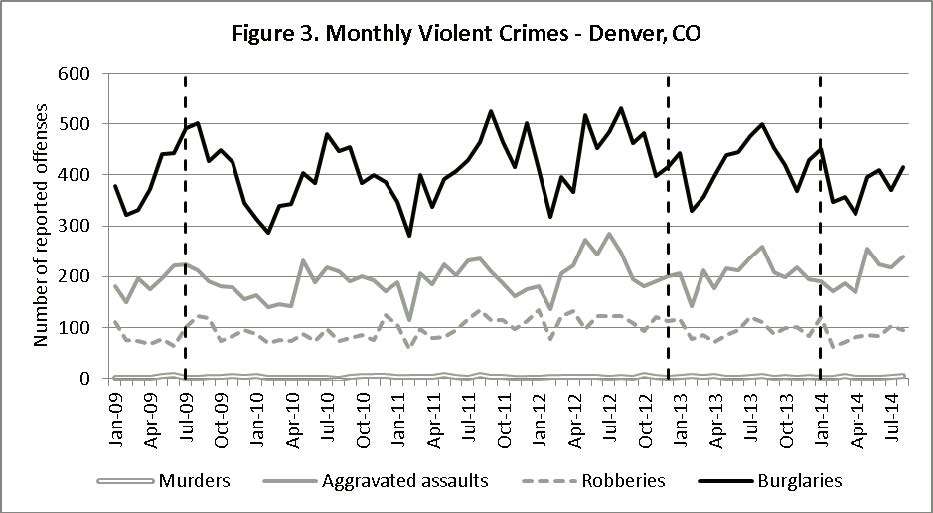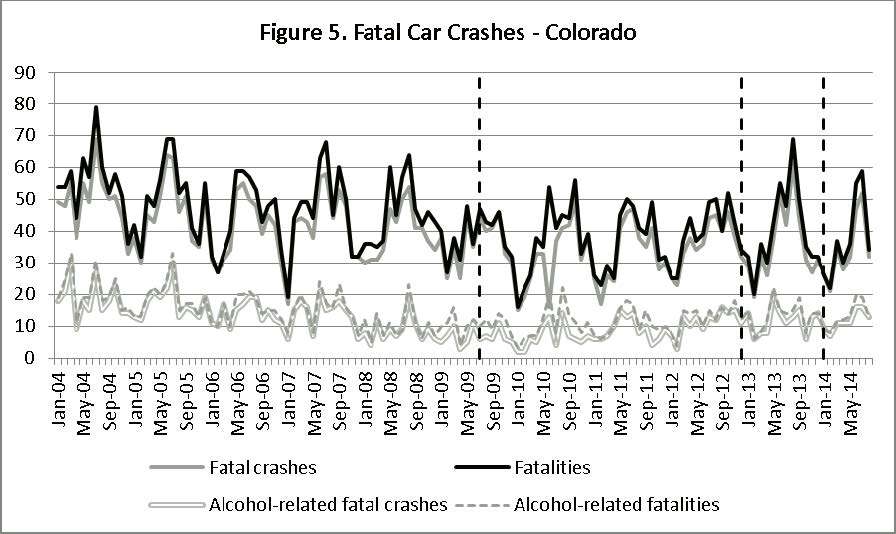Cato Paper Highlights Marijuana Legalization's Ho-Hum Impact in Colorado
In a new Cato Institute working paper, Harvard economist Jeffrey Miron finds little evidence that the loosening of marijuana prohibition in Colorado has had a noticeable impact on adult or underage cannabis consumption, traffic accidents, violent crime, drug treatment admissions, emergency room visits, drug-related deaths, educational outcomes, or economic growth. Miron, Cato's director of economic studies, considers trends in these indicators before and after 2009, when the medical marijuana industry took off due to regulatory developments that made it more secure, and 2012, when voters approved Amendment 64, which legalized marijuana for recreational use. Generally speaking, there is no significant change in these trends after those policy shifts. Here, for example, is how violent crime rates in Denver look:

In this case, data are available for the months following the beginning of legal recreational sales last January. Looking at murders, aggravated assaults, robberies, and burglaries, Miron concludes that "no measure indicates a significant change in crime after medical marijuana commercialization, legalization adoption, or full legalization implementation."
I have discussed some of these trends here, including crime, underage use, traffic fatalties, and drug treatment admissions. Miron also looks at several educational outcomes: school suspensions, standardized test scores, and high school graduation and dropout rates. Changes in marijuana policy do not seem to have had an impact on these outcomes, with the exception of drug-related suspensions, which rose after the commercialization of medical marijuana in 2009 and again after the legalization of recreational marijuana in 2012, even as total suspensions declined.
Miron not only finds little evidence of negative fallout from changes in Colorado's marijuana policies; he also finds little evidence that legalization has had a positive impact on the measures he considers. It does not seem to have slowed or accelerated economic growth, for example, or to have increased or reduced traffic accidents. Looking at "fatal car crashes, fatalities in car crashes, alcohol-related fatal car crashes, and fatalities in alcohol-related car crashes," Miron finds that "no measure exhibits a substantial change at the time of marijuana policy changes."

Miron concludes that "strong claims about Colorado's legalization, whether by advocates or opponents, are so far devoid of empirical support." As far as broad legalization goes, of course, it is still early going in Colorado, and negative or positive effects may become apparent in the coming years. Miron plans to keep an eye on trends in Colorado and other states that legalize marijuana, ultimately comparing them to data from other states to get a clearer idea of what happens after prohibition ends.
Editor's Note: As of February 29, 2024, commenting privileges on reason.com posts are limited to Reason Plus subscribers. Past commenters are grandfathered in for a temporary period. Subscribe here to preserve your ability to comment. Your Reason Plus subscription also gives you an ad-free version of reason.com, along with full access to the digital edition and archives of Reason magazine. We request that comments be civil and on-topic. We do not moderate or assume any responsibility for comments, which are owned by the readers who post them. Comments do not represent the views of reason.com or Reason Foundation. We reserve the right to delete any comment and ban commenters for any reason at any time. Comments may only be edited within 5 minutes of posting. Report abuses.
Please to post comments


I suspect the reason why marijuana legalization remains such a legitimate candidate among so many people is because it hasn't been much of a partisan issue nationally.
If progressives associated legalization with Republicans, a whole lot more people would be against it. If more Republicans associated the issue with progressives, a whole lot more people would be against it.
The longer we keep from making it a partisan issue, the more progress we'll make. What we say to people is a lot more important than which party we vote for, that's for sure.
Contrast marijuana with, say, gay marriage. The progress we're seeing on gay marriage is mostly coming from the courts--not the political sphere, not from party politics. And getting progress through the courts takes half of freakin' forever.
That is an interesting point. At this point it is really hard to claim that either side is any better on the issue.
I wouldn't mind seeing the courts do something about Federal prohibition, though. Or at least explain the magical transformation that made prohibition constitutional without amending the constitution.
Duh, general welfare. Government can do anything not specifically prohibitted, as long as its intentions are good.
Colorado's Medicinal laws were such that anybody who wanted an MMJ card could pretty much get one. The list of ailments that qualified for a card was as long as your arm and included ailments such as back pain, insomnia, and diarrhea. (Pretty much the only thing *NOT* on the list was PTSD.)
When recreational went legal, the only thing that changed was that tourists were now smoking. The locals who were inclined to smoke got MMJ cards years before.
Now... when the Feds remove the demon weed from the list of substances that they test for with regards to clearances and/or what applies to a "Drug-Free Workplace"?
It's at that point that I'd be more interested in looking at numbers because that's the point at which the numbers would fundamentally change.
remove the demon weed from the list of substances that they test for
It appears to me that there is an industry devoted to keeping this from ever happening.
Going by the first chart, looks like the best way to reduce crime is to make summer illegal.
There's quite the correlation of high crime and the Rockies being eliminated from playoff contention.
That usually happens in the Spring, though.
Please put your ban boner away.
As I have always said the people who want to smoke pot are smoking pot. Legalizing it will not cause people who don't want to smoke pot start smoking it.
There is one effect of legalization conspicuously missing and it is the one that most concerns the pols and cops; dollar amount of property seized in MJ busts.
You are probably right for most people. But there are people (like me) who are curious but utterly clueless/too scared to get drugs through illegal means.
You make it sound so nefarious. I can't speak about all instances, but for me it's about as dangerous as texting my gal and going to go pick it up at her house.
The only scary part is she has a kid, and I'm always afraid she's going to ask if I want to hold it.
Well, if you don't know anyone who smokes, it's not so easy. And if you don't look like you are "cool", people you don't know well probably will hesitate to help you out.
I guess I've just always been lucky. I've gone out of town for work before and found several hook-ups in a couple hours... Good thing, too; I misjudged my own intake and needed more.
I bet there are a lot of people who don't really know how to get it illegally. I know I've always been too shy to ever bring up the subject with strangers, or even friends if I don't already know how they feel about it. The only times I've ever smoked pot was when somebody actually invited me to do it.
I imagine there are a lot of people who are similarly reluctant to ever ask about taboo subjects like this. Social inhibitions can be very powerfull, and people who don't suffer from them don't always realize how strong they can be.
If you don't have any friends who are open about pot, then you can go for years without ever having an opportunity to try it. The ability to simply walk into a store and buy it can make a huge difference.
Some people are terrified of getting arrested and getting their kids put in foster care. If you're not popular with the police, that can be a real concern.
I do know several people who didn't smoke it because of the legality, but now do when they are in Colorado.
But for the most part, I think it is true. Most people who want to smoke weed do so now. And most adults have already figured out if they like it or not.
But...but...BUT!!!!!111111!
Well, if things are exactly the same then there is no reason we shouldn't go back to prohibition. Thanks for nothing you reckless voters!
/LickinPooper
Interesting that drug related suspensions were up, but use among minors was not. Are kids more open about it? Are admnistrators more on the look out?
Nice way to hide behind the facts, Reason. I see no graph showing trends of Jazz musicians sleeping with white women. Where's that graph?
+1 Anslinger.
i hate to say I told you so!!!
Same here in WA
also contrary to predictions of the anticop bigots, the Feds here in WA have left largely well enough alone
I told you so!
:l
It's amusing to get offered a bong hit on a paper detail
This is why the prohibitionists fought this so hard and didn't engage in a tactical retreat. After none of their dire predictions came true, it is going to be that much more difficult to defend prohibition in other states and of other drugs.
We saw the same with RTKBA
naysayers wanked about 'Blood in the streets'
Crime went down
Antis backtracked and evaded
Nice protesting and police action in Phoenix
Booya pepper spray!
But I read the stories! Marijuana is killing puppies and children! The number of deaths related to marijuana has skyrocketed since legalization. Skyrocketed, I read it on Drudge! You dopies around here hate the children and want children and puppies to die from eating deadly marijuana! And what about our highways? It wasn't bad enough that drunks are killing millions, but now it's tens of millions of highway fatalities a day because of pot!
Well, deaths from marijuana overdose haveincreased 70 trillion times in the past year.
I guess it is pretty easy to get to 70 trillion when you start with zero.
And don't forget that Maureen Dowd took some pot and freaked out. That must count for something. I mean it couldn't just be that she's an overly hyperbolic ball of fluff.
I read something by Maureen Dowd and freaked out. Ban her.
Yeah, I love it when people write those articles where they basically overdose on edibles and then write about it as if it is the typical experience of people who enjoy the drug. Some woman in the UK wrote a similar story several years ago. Because people just love drugs that cause anxiety attacks and confused paranoia.
If it saves even one puppy/child's life, are we not obligated?
Marijuana is killing puppies and children! ... And what about our highways?
According to the graph, fetal car crashes haven't been increasing.
This letting fetuses drive cars has got to stop, they aren't even people for the lub of jeebus, they're just some tissue! The teabagger extremists have went to far with this right to life stuff!
I oppose mandatory identification for fetuses.
As a more than 40 year cannabis user, both illegally and now legally (medical card), I can attest that the greatest harm cannabis does is from being illegal and ruining peoples lives for a relatively harmless herb. If the pols really want to protect the public from itself, then alcohol would be a good place to start. Of course, that will never happen given the financial interface booze has on the American economy. Booze is a money maker for the government and Pot isn't, if it were legalized.
My buddy's sister-in-law makes $83 /hour on the computer . She has been without work for 8 months but last month her pay was $17994 just working on the computer for a few hours.
For information check this site. ????? http://www.jobsfish.com